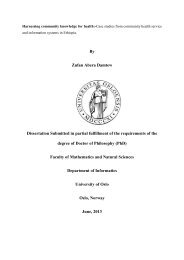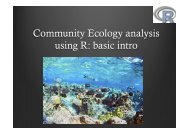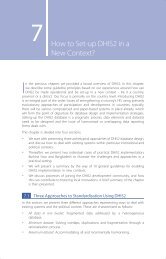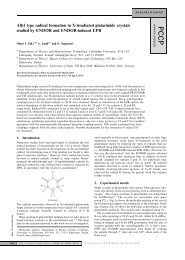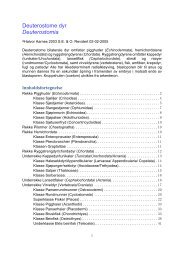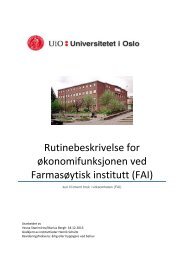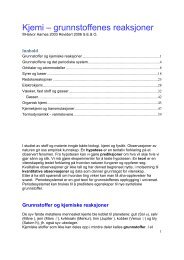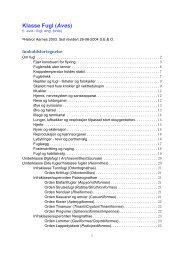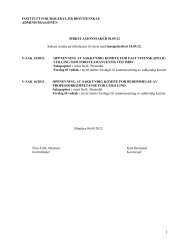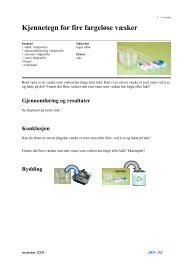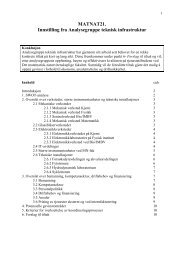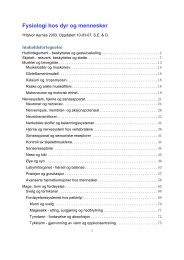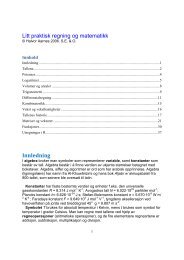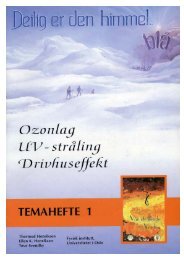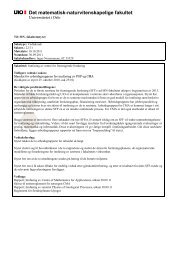Evaluation of individual research units - Norges forskningsråd
Evaluation of individual research units - Norges forskningsråd
Evaluation of individual research units - Norges forskningsråd
Create successful ePaper yourself
Turn your PDF publications into a flip-book with our unique Google optimized e-Paper software.
University <strong>of</strong> Bergen<br />
Bergen Museum Natural History Collections<br />
<strong>Evaluation</strong> <strong>of</strong> biology, medicine and health <strong>research</strong> in Norway (2011)<br />
Description <strong>of</strong> institution<br />
The Natural History Collections (De naturhistoriske samlinger, DNS) is a self-contained<br />
unit within Bergen Museum established in 2002, covering botany, geology and zoology.<br />
DNS consists <strong>of</strong> 10 biological collections with 14 scientific staff members, two<br />
postdoctoral fellows, and 14 technical staff. The <strong>research</strong> is connected to the scientific<br />
collections and reflects a range <strong>of</strong> organisms, taxonomic groups and <strong>research</strong> fields. DNS<br />
has three main <strong>research</strong> areas within biology: classic taxonomy and systematics, mainly<br />
on the basis on morphological characters; phylogenetics, systematics and evolution,<br />
which draws from molecular methods and morphology; and palaeobiology focusing on<br />
osteobiology and palaeobotany. DNS holds different types <strong>of</strong> collections and thus gives a<br />
range <strong>of</strong> scientific advice to governing authorities. There is a strong emphasis on the<br />
publication and dissemination <strong>of</strong> popular science.<br />
General evaluation & recommendations<br />
The budget lacks flexibility to facilitate strategic investment. It appears there could be<br />
more focus on publishing papers in ISI-ranked journals. Seven <strong>of</strong> the scientific staff are<br />
in their sixties. Plans for succession might provide an opportunity to consider gender<br />
balance, which is currently 71% male. The establishment <strong>of</strong> the Norwegian-Swedish<br />
<strong>research</strong> school in biosystematics is a highly positive development and we recommend<br />
retaining broad national and international collaborations. The Panel also suggests<br />
devising a reward system for staff working in collection management and dissemination.<br />
Follow up <strong>of</strong> previous evaluation<br />
In apparent response to calls for open access to data, DNS has become involved in<br />
projects and databases such as Artskart, GBIF and Barcoding <strong>of</strong> Life. The Panel agrees<br />
with the recommendation from the 2000 evaluation that biosystematics <strong>research</strong> should<br />
be expanded. Similarly, we agree with the previous recommendation to emphasise interdisciplinary<br />
<strong>research</strong>.<br />
The Panel concurs with the strategy <strong>of</strong> the Bergen Museum to be highly visible, conduct<br />
focused <strong>research</strong> on natural and cultural history, engage in dissemination <strong>of</strong> <strong>research</strong><br />
results, and manage the collections safely and productively.<br />
We strongly recommend collaboration among university museums in Norway and the<br />
resulting development <strong>of</strong> a Norwegian-Swedish <strong>research</strong> school in biosystematics, with a<br />
focus on recruitment <strong>of</strong> PhD students.<br />
37



